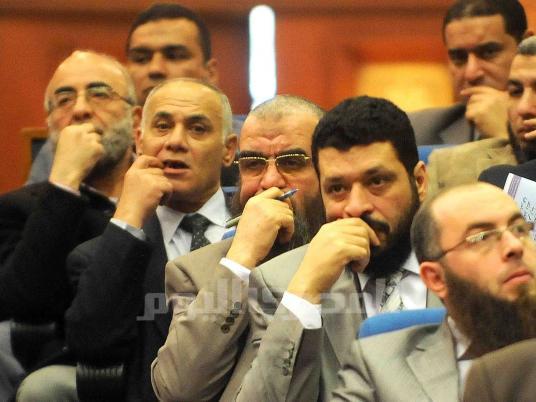
Many notable public figures have been denied membership in the 100-person assembly tasked with writing Egypt’s new constitution, after the Parliament decided to select Islamists to nearly two-thirds of its seats.
The number of public figures nominated for membership was 646, of whom 50 were selected as non-parliamentary members and 20 designated as reserves.
On Saturday, MPs elected the body by writing down the suggested names of members.
Many notable figures were not among the 50 highest vote-getters. Those figures were not only secular but also notable Islamists, such as prominent Salafi preacher Yasser Borhamy, considered one of the most prominent religious authorities in Egypt for the ultra-conservative Muslims. Another well-known Salafi cleric, Mohamed Hassan, was also not selected.
Also, Tarek al-Bishry, chairman of the Constitutional Amendments Committee formed early last year, didn’t receive enough votes.
Other Islamist figures failing to collect enough votes were Al-Azhar Grand Sheikh Ahmed al-Tayyeb, Grand Mufti Ali Gomaa and Salafi preacher Abu Ishaq al-Howeiny.
Muslim Brotherhood who also fell short were Supreme Guide Mohamed Badie, businessman Hassan Malek, and Freedom and Justice Party leading figure Ahmed Abu Baraka.
As for prominent secular figures, Mohamed Ghoneim, the famous surgeon and member of Parliament, failed to get enough votes.
The list of those omitted also contains Ahmed Zewail, a Nobel Prize laureate, and Mohamed Nour Farahat, an eminent law professor.
It was not surprising, however, that Mervat al-Talawy, head of the National Council for Women, was excluded. For almost two months now, Islamists in Parliament have subjected Talawy and the council to severe criticism.
Also failing to get in was film director Khaled Youssef, who recently launched an initiative to unite intellectuals against any attempts by the Islamist-dominated Parliament to curb freedom of expression.
Left out as well were prominent Coptic figures, such as researcher Samir Morcos and journalist Karima Kamal.
Notable human rights figures, such as Bahey Eddin Hassan, director of the Cairo Center for Human Rights Studies, and Kamal Abbas, a labor rights activist, also failed to garner enough votes for membership.




